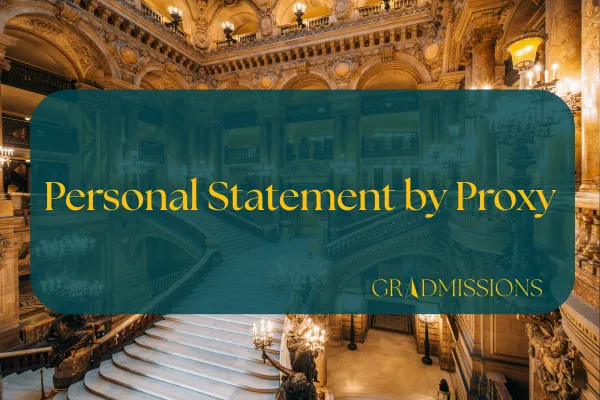
Personal Statement by Proxy Series | The Phantom of the Opera
Hi y'all. Autumn here. It’s Sunday night, October 26 🎃, and I’m sitting here on the edge of Halloween week with an idea I probably should have ignored, but didn’t.
Imagine if the Phantom of the Opera got it together. Therapy, hygiene, personal growth. Imagine he looked up from his subterranean pipe organ, decided haunting was no longer a viable career path, and thought, “You know what? I should go to law school.”
The question is where would he want to go, and what on earth would he write in his personal statement?
Tonight, I’m so privelidged and honored to be serving as the Phantom’s proxy. I’m writing the personal statement he would have written if he’d stopped dropping chandeliers and scored well on the LSAT (so we know he didn't take in October, amirite?) Keep your hands at the level of your eyes. We’re going in.
This is part of a new series I’m building to help law and med school applicants understand what a personal statement can be. You already know these characters, which makes it easier to see how story, voice, and vulnerability come alive when done right. The goal isn’t parody, but possibility. If a ghost in a mask can sound human on paper, then you can too. Got a recommendation for my next proxy assignment? Email me [email protected]
Now the curtains open as the orchestra swells, and the Phantom and I proudly present his law school personal statement:
Justice was a mirror. Flawless. Reflective. Merciless. When the world first saw my face, it rendered judgment before I could speak. No counsel, no hearing, no appeal. So I built my own courtroom underground.
If one can call a life spent in catacombs a childhood, mine was an education in precedent. I learned early that fairness was reserved for those who could stand in the light without frightening anyone. The beautiful received mercy while the rest of us learned to suffer our own trials in secret.
Beneath the Palais Garnier I constructed a sanctuary. It was my stage and courtroom all at once. The opera house above became my study in human law where statutes were written in applause, and verdicts delivered in curtain calls. I composed Don Juan Triumphant as my closing argument, an aria for the misunderstood defendant. They called it terrorism. I called it procedure. I demanded only due process before execution by chandelier.
For years I believed order could be achieved through design. Every trapdoor was precedent. Every trick mirror, a cross-examination. I thought if I built the architecture perfectly, justice would echo through it. Yet even as the orchestra obeyed, fairness did not. Christine’s mercy taught me what the law books never will: redemption cannot be coerced, and silence is not consent. When she looked at me, she saw more than a monster to punish. For once, I was a human to understand. It was the first fair ruling of my life.
Since then, I have studied law as I once studied music. Each rule is a note. Each precedent is a motif. Justice, like composition, is rarely spontaneous. It requires restraint and the humility to know when to listen. The phrase reasonable person fascinates me. I have never met one, but I admire the ambition. I read opinions by candlelight, scribbling questions in the margins. How does motive weigh against appearance? Can remorse serve as evidence? At what point does a villain become the victim of narrative editing?
My experience with conflict resolution is unconventional but extensive. I have mediated labor disputes between prima donnas and stagehands, drafted binding performance clauses (somewhat literally), and negotiated under extreme emotional duress. My record in alternative dispute resolution is strong, particularly in matters requiring orchestral accompaniment. Admittedly, my early methods were heavy on dramatic lighting. I am working on that.
I’m beginning to think the courtroom is the only stage where truth can be sung without disguise. Every witness performs, every attorney conducts, and the wise ones know that volume is not virtue. The law practiced with empathy listens beneath the melody for the dissonance that reveals character and depth. I have spent a lifetime composing in darkness, but even there I heard the faint harmony of accountability and grace.
Notre Dame Law is the only place I can imagine continuing that work. Its faith in redemption does not end with absolution. It begins with it. It is a school where moral courage fears not the shadows, and intellect still serves mercy. I have lived under cathedrals long enough to recognize sacred architecture when I see it. The Basilica’s vaulted ceilings remind me that justice, like music, requires resonance to endure.
I’m not seeking exoneration, just education. I will advocate for others whose faces or stories cause the world to look away and shudder. I’ll work to translate the hidden arias of the accused into something the living can finally hear. I know I am an unusual applicant. A half-masked composer, a builder, a former ghost, but every law has its exceptions, and every case its precedent.
If admitted, I promise only this: my days of dropping chandeliers are over. My only remaining demand is a seat in the classroom, preferably not Box Five.





